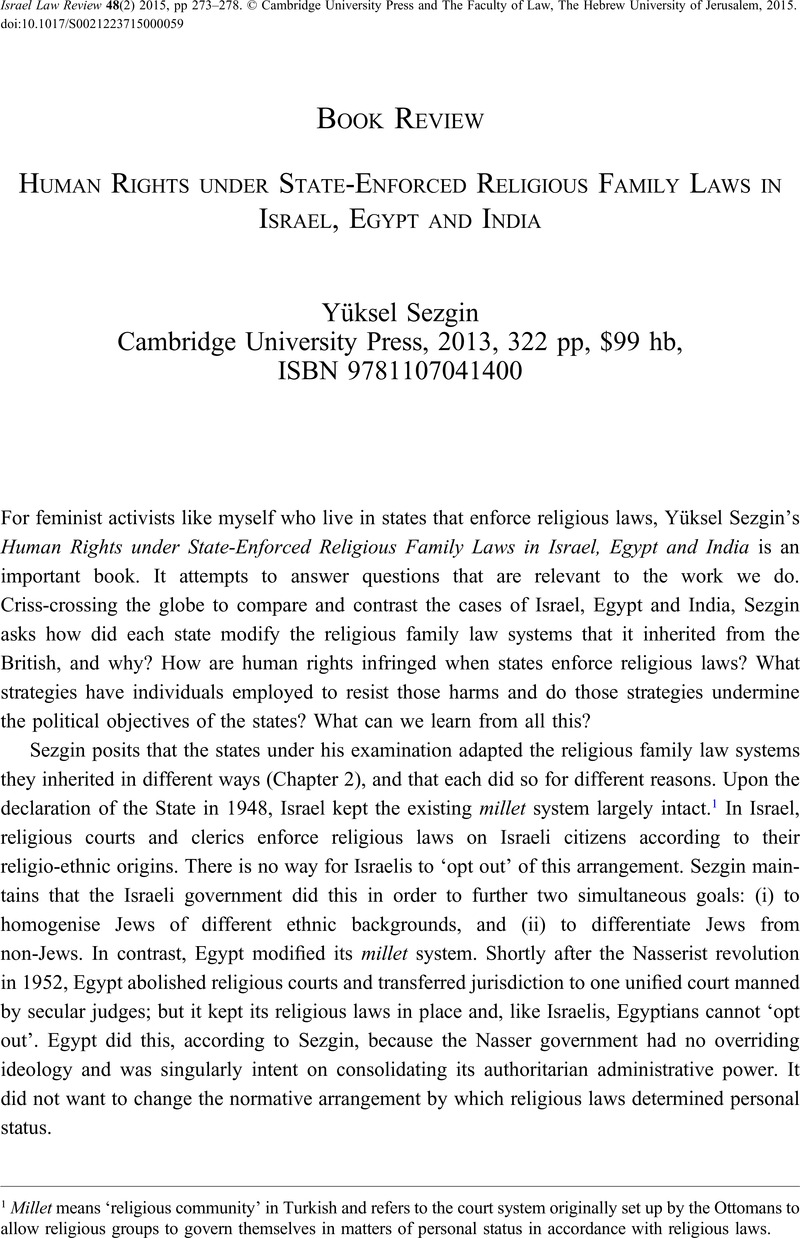No CrossRef data available.
Article contents
Human Rights under State-Enforced Religious Family Laws in Israel, Egypt and IndiaYüksel Sezgin Cambridge University Press, 2013, 322 pp, $99 hb, ISBN 9781107041400
Published online by Cambridge University Press: 11 June 2015
Abstract

- Type
- Book Review
- Information
- Copyright
- Copyright © Cambridge University Press and The Faculty of Law, The Hebrew University of Jerusalem 2015
References
1 Millet means ‘religious community’ in Turkish and refers to the court system originally set up by the Ottomans to allow religious groups to govern themselves in matters of personal status in accordance with religious laws.
2 Mohammed Ahmed Khan v Shah Bano Begum [1985] 3 SCR 844.
3 Giddens, Anthony, Nation State and Violence: Volume Two of a Contemporary Critique of Historical Materialism (Polity Press 1987) 120Google Scholar.
4 For example, Israeli women may now sue their Jewish husbands for damages in family courts if their husbands refuse to divorce them: see Weiss, Susan, ‘From Religious “Right” to Civil “Wrong”: Using Israeli Tort Law to Unravel the Knots of Gender Equality and Jewish Divorce’ in Joffe, Lisa Fishbayn and Neil, Sylvia (eds), Gender, Religion, and Family Law: Theorizing Conflicts between Women's Rights and Cultural Traditions (Brandeis University Press 2012) 119Google Scholar.
5 Penal Law, 1977 (Israel), ss 176, 181; India has similar criminal provisions: see Sezgin, Yüksel, Human Rights under State-Enforced Religious Family Laws in Israel, Egypt and India (Cambridge University Press 2013) 167–68CrossRefGoogle Scholar.
6 Convention on the Elimination of All Forms of Discrimination against Women (entered into force 7 August 1956) 1249 UNTS 13.
7 The Jewish customary rule that punishes innocent children born of incestuous or adulterous relations.
8 Sezgin describes how, in 2001, the Supreme Court of India in Danial Latifi held that the MWPRDA rules regarding alimony are consistent with the Shah Bano decision, thus effectively forcing Muslim alimony laws back in line with secular laws. He also notes, however, that similar attempts in 1997 and 2000 to garner judicial support to challenge Muslim inheritance, polygamy and unilateral divorce laws were not successful: Sezgin (n 5) 191–92.
9 Appadurai, Arjun, Modernity at Large: Cultural Dimensions of Globalization (University of Minnesota Press 1996) 19Google Scholar.
10 Moghadam, Valentine V, ‘Islamic Feminism and Its Discontents: Toward a Resolution of the Debate’ (2002) 27 Signs 1135CrossRefGoogle Scholar, 1160, 1163.
11 Merry, Sally Engle, ‘Transnational Human Rights and Local Activism: Mapping the Middle’ (2006) 108 American Anthropologist 38CrossRefGoogle Scholar.




